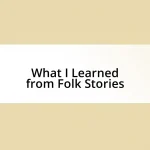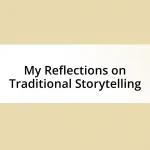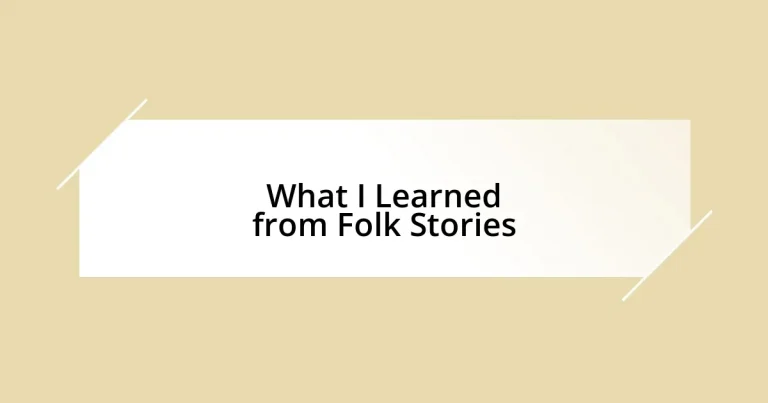Key takeaways:
- Folk stories serve as cultural backbones, transmitting values, preserving history, and fostering community identity.
- They offer profound moral lessons, encouraging traits like generosity, resilience, and empathy across generations.
- Character analysis in folk tales highlights human traits and inspires personal growth through relatable narratives.
- Preserving these stories is essential for maintaining cultural heritage, especially in today’s digital age, integrating them into education can enhance understanding and pride.
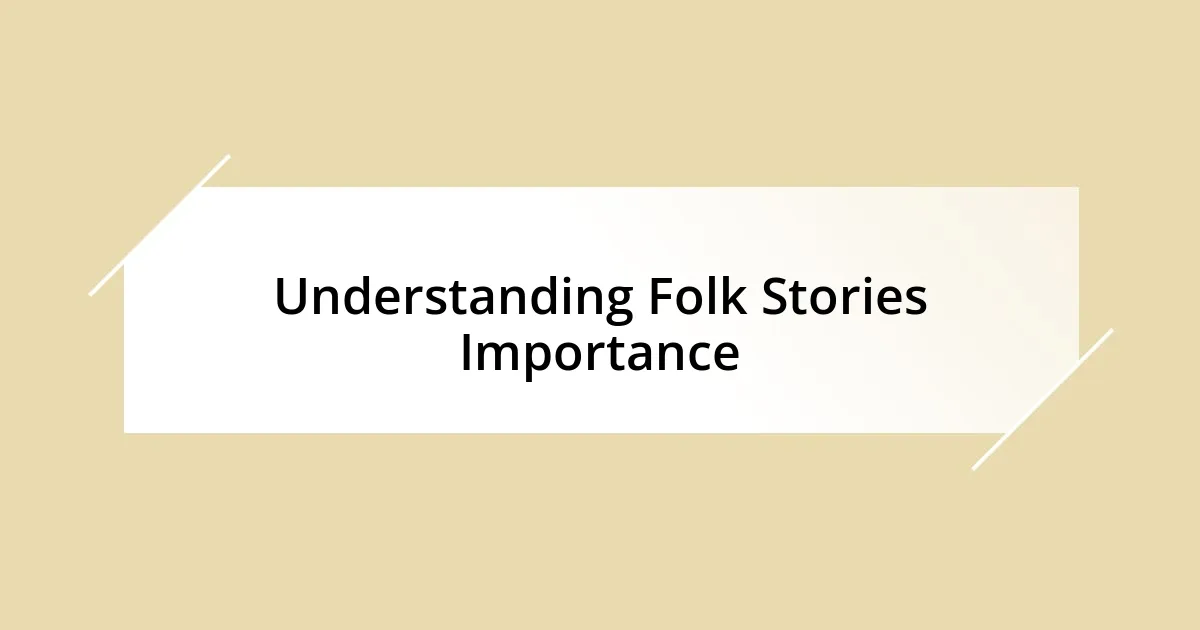
Understanding Folk Stories Importance
Folk stories hold immense importance as they serve as the cultural backbone of communities. I remember sitting around a campfire as a child, captivated by the tales my grandparents shared; each story was a portal to our past and a way to understand our traditions. Have you ever considered how these narratives shape our identities and values?
These stories often convey moral lessons and universal truths that resonate across generations. For instance, I once heard a tale about a clever fox outsmarting a boastful lion. This not only entertained but also instilled in me the value of humility. Isn’t it fascinating how a simple story can teach us such powerful life lessons?
Additionally, folk stories play a crucial role in preserving history and promoting empathy by allowing us to step into the shoes of others. I recall being moved by a story of struggle and resilience from a different culture; it sparked a desire in me to learn more about that world. How many more perspectives can we gain by exploring these rich narratives?
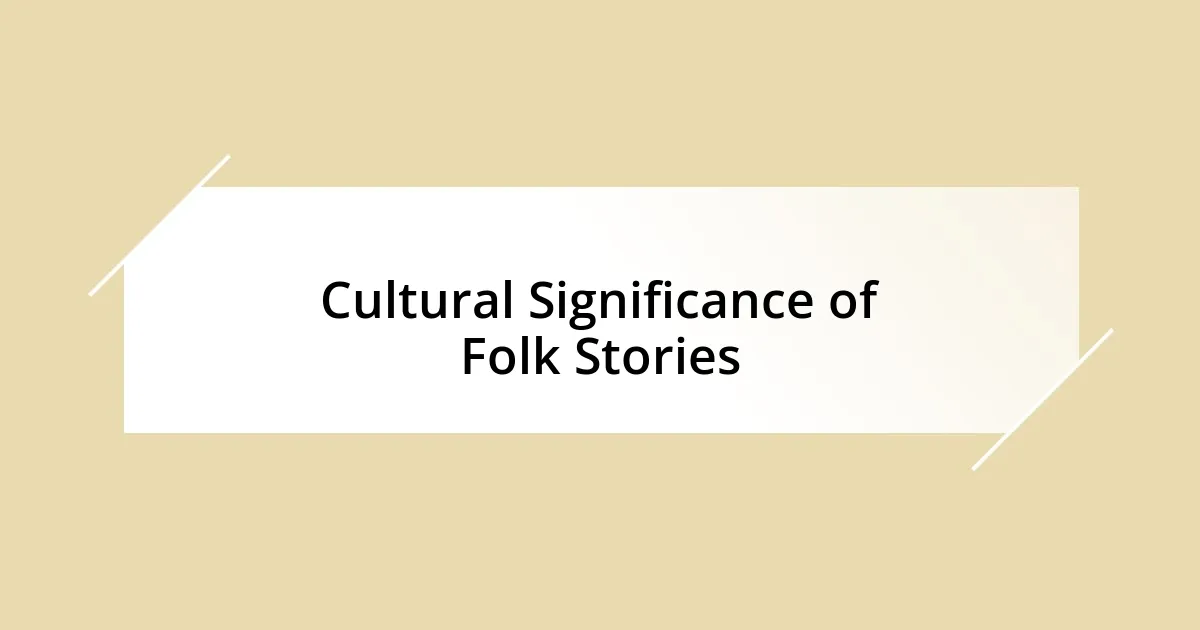
Cultural Significance of Folk Stories
Folk stories are not just entertainment; they are a vital means of transmitting cultural knowledge. I remember listening to tales from my father’s homeland, filled with enchanting creatures and heroic deeds. Each story painted a vivid picture of the customs and beliefs of that time, making me feel closer to my ancestry in a way that textbooks never could. Isn’t it remarkable how a narrative can bridge generations and connect us to our roots?
Moreover, these stories often serve as a unifying force for communities, fostering a sense of belonging among their members. At a community gathering, I once heard an elder recount our town’s founding myth, and I could feel the pride radiating from everyone present. It was incredible to witness how shared narratives can strengthen social bonds and cultivate collective identity. Have you ever felt that sense of unity when listening to a familiar story?
Furthermore, folk stories provide a canvas for exploring cultural values and societal norms, often reflecting the struggles and triumphs of a people. I can still recall a moving folktale about a courageous girl defying the odds, which inspired me to challenge societal expectations in my own life. Through such narratives, we not only learn about different cultures but also gain insight into our own. What powerful lessons reside in these timeless tales that continue to shape our human experience?
| Cultural Function | Personal Impact |
|---|---|
| Transmits cultural knowledge | Connects us to ancestry |
| Unifies communities | Strengthens social bonds |
| Explores values and norms | Inspires personal growth |
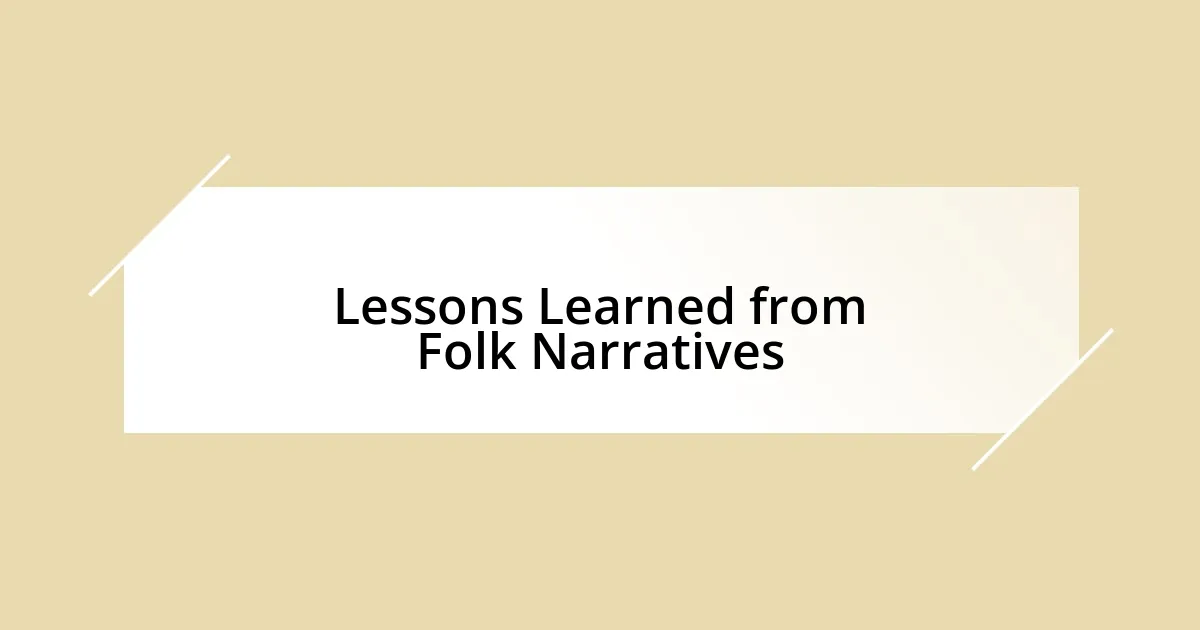
Lessons Learned from Folk Narratives
Lessons learned from folk narratives often resonate deeply, offering profound insights into human nature and societal values. I recall hearing a tale about a poor farmer who, despite his struggles, chose to share his meager harvest with a traveler. This story struck a chord with me, teaching the importance of generosity and kindness even in challenging times. It’s remarkable how a narrative can stay with you, influencing your behavior long after you’ve heard it.
Through folk stories, we also learn about resilience and the power of hope. I remember a captivating story about a young woman who faced tremendous obstacles but ultimately triumphed through her unwavering spirit. This taught me that life’s trials can oftentimes lead to unexpected growth and strength. Here are some key lessons I’ve gathered from various folk narratives:
- Generosity in hardship: Sharing our blessings, even when scarce, fosters community and connection.
- Resilience in adversity: Facing challenges can help cultivate strength and character.
- Empathy through diverse perspectives: Understanding different experiences broadens our worldview and nurtures compassion.
- Courage to challenge societal norms: Stories inspire us to question limitations and pursue our true selves.
- Value of storytelling itself: Engaging with these narratives fosters a love for sharing experiences and wisdom.
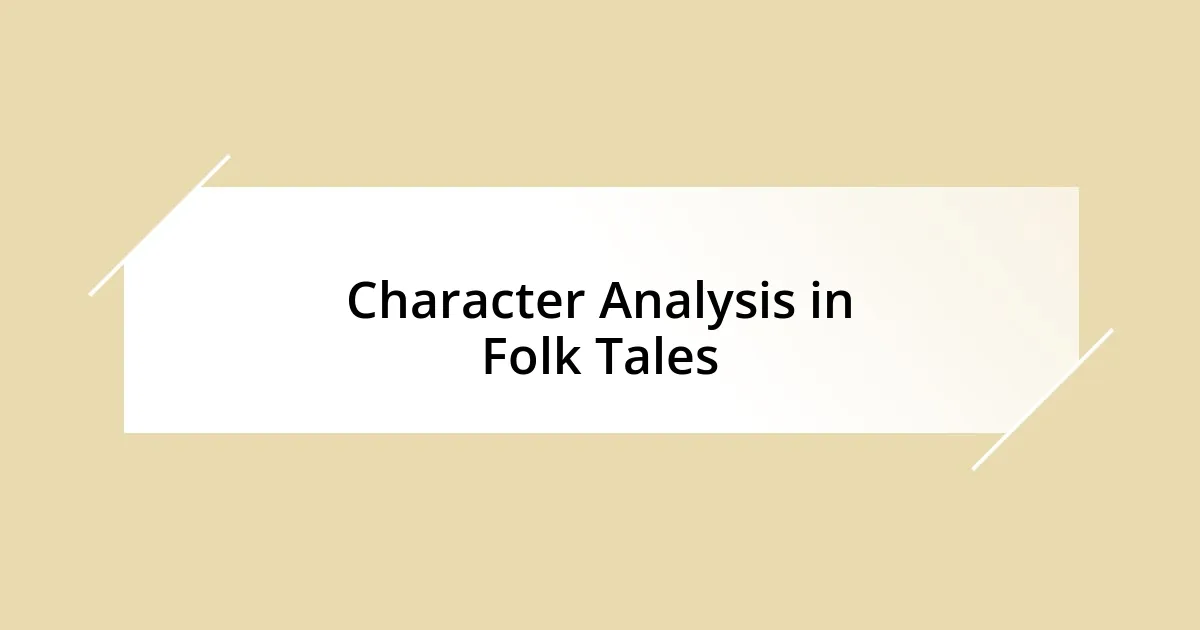
Character Analysis in Folk Tales
Folk tales often present a richly woven tapestry of characters, each embodying specific traits that speak volumes about human nature. Take the cunning trickster, for example. I remember being captivated by tales of these clever characters who outsmart their foes, often using wit over strength. Their adventures remind me of times when quick thinking has helped me navigate tricky situations. Can you think of moments when you had to rely on your cleverness to solve a problem?
Then there’s the archetypal hero, whose unwavering courage becomes symbolic of the struggles we face in life. In one story, a humble villager transformed into a fierce warrior, showing that true bravery can come from the most unexpected places. Reflecting on this, I often find myself inspired when facing my own challenges, realizing that it’s not always the loudest voices that conquer adversity. How many heroes do you carry within you, waiting for the chance to shine?
Contrasting these figures, we have the wise elder, whose knowledge and experience guide the younger generations. I fondly recall conversations with my grandmother, where her stories, much like those elders in folk tales, offered lessons laden with wisdom. They always made me ponder how much we can learn from our elders if we listen closely. Don’t you feel there’s a treasure trove of insights waiting to be uncovered in their tales? Through character analysis, we not only uncover morals and lessons but also reflect on our personal growth and the relationships that shape us.
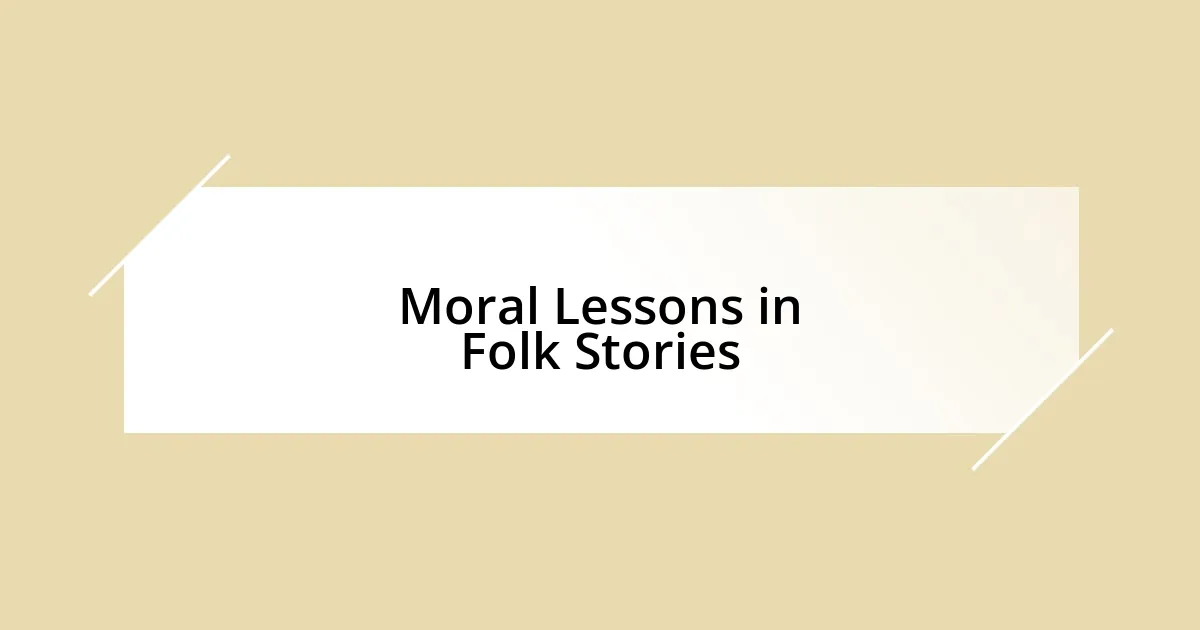
Moral Lessons in Folk Stories
Folk stories offer a treasure trove of moral lessons that resonate deeply within us. I vividly remember a tale about a young boy who returned a lost item to a stranger, only to find that the stranger was a wealthy merchant. The joy in their exchange went beyond material wealth; it highlighted the significance of honesty and integrity in our actions. Have you ever experienced a moment where your honesty shaped an unexpected outcome? Those moments can redefine how we perceive ourselves and others, reminding us that moral integrity often reaps its own rewards.
A recurring theme in these narratives is the value of empathy. There’s a story I encountered where a humble rabbit helped a distressed lion find his way home. Initially, it seemed absurd for such a small creature to assist a powerful beast, but this tale illuminated how understanding others’ plight can uplift everyone involved. It strikes me how, frequently, we underestimate our ability to impact someone’s life positively, no matter how small we might feel. Have you had a time when showing empathy led to a surprising connection? These stories encourage us to step beyond our comfort zone and foster bonds that might change our lives or someone else’s.
Lastly, folk stories explore the courage to confront societal norms. In one narrative I cherished, a young girl defied her village’s expectations to pursue her dream of becoming a healer. This tale resonated with me, awakening thoughts about the societal pressures we all face. Why do we sometimes hesitate to break free from tradition? The courage she displayed reminds me of moments when I’ve gone against the grain to follow my passion. Stories like these serve as beacons of motivation, nudging us to carve our own paths, even when opposition looms large.

Applying Insights from Folk Stories
The insights drawn from folk stories can be surprisingly applicable in our daily lives. For instance, I often think about a tale I heard about a widow who used her skills in weaving to help her community during hard times. This story nudges me to evaluate how we can leverage our talents for the greater good. Have you ever identified a skill you possess that could help others?
These narratives also provide a framework for navigating moral dilemmas. I recall a personal moment that mirrored a story where a character had to decide whether to act in self-interest or support a friend in need. Choosing to help my friend, despite the inconvenience, reminded me of the importance of loyalty and kindness over convenience. How often do we find ourselves at crossroads where our choices define who we are?
I’m particularly drawn to stories that illustrate resilience, particularly when characters face insurmountable odds. A gripping tale I absorbed told of a farmer who fought against perpetual drought through sheer determination. That tenacity inspires me every time I face my challenges, reminding me that persistence often opens doors that seem forever shut. When was the last time you felt like giving up, only to discover strength you didn’t realize you had? Folk stories encapsulate these moments beautifully, encouraging us to keep pushing forward even when the going gets tough.
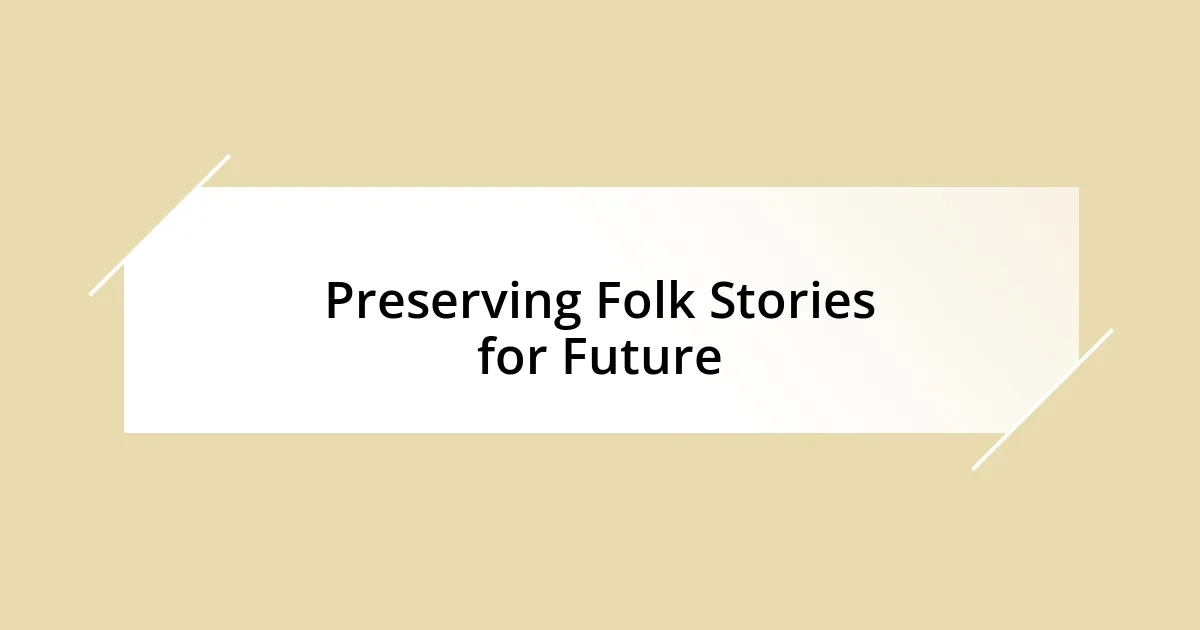
Preserving Folk Stories for Future
Preserving folk stories for future generations is essential, as these narratives hold the fabric of our cultural identity. I often think about my grandmother sharing stories around the fireplace, her voice weaving magic into each tale. Have you ever felt that comforting connection to a story rooted in your heritage? Those moments remind me that preserving these tales isn’t just about keeping them alive; it’s about passing down values and wisdom that shape who we are.
In today’s digital age, it’s fascinating how technology offers new ways to capture and share folk stories. I recently participated in a community project where we recorded local storytellers, preserving their unique dialects and expressions. Watching the community come together to celebrate our narratives felt profoundly rewarding. How can we ensure that these stories don’t fade away in our fast-paced world? Engaging our younger generations, perhaps through interactive storytelling sessions, could spark their interest in our rich traditions.
Lastly, I believe it’s vital to incorporate folklore into education. I remember an inspiring teacher who introduced us to folk tales as part of our curriculum. It made history come alive; suddenly, learning wasn’t just about dates and events, but about real emotions and experiences. What if we encouraged more educators to blend storytelling with lessons? This could foster a deeper understanding of our roots and instill a sense of pride in our cultural heritage. After all, every story we share has the potential to inspire and connect us across generations.


